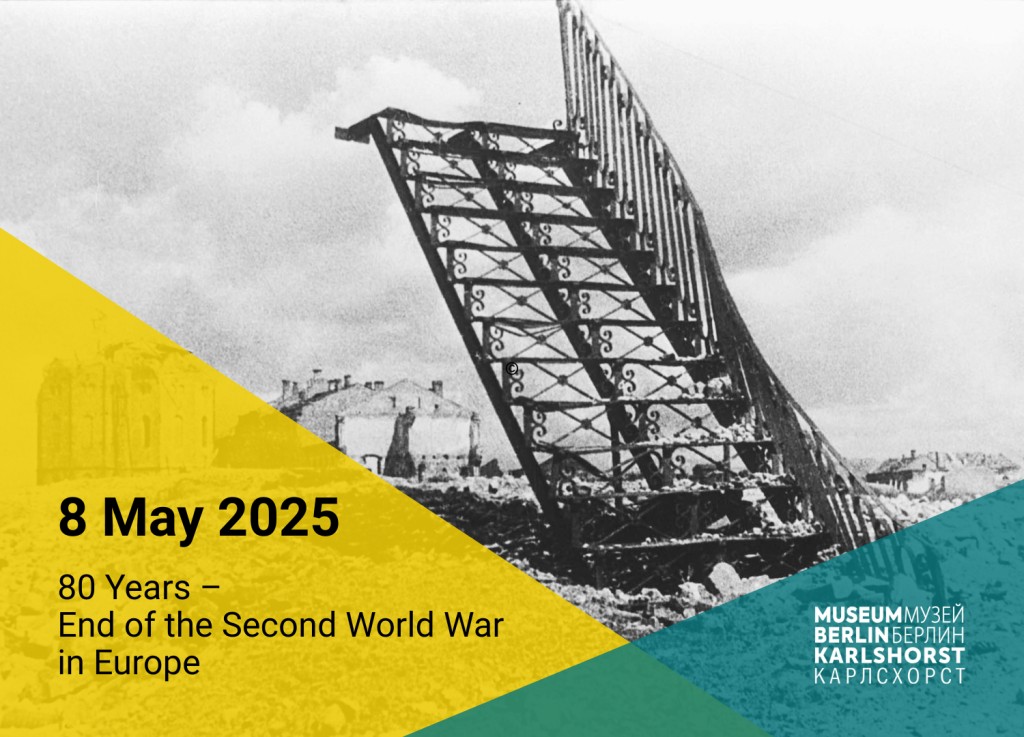The Second World War in Europe ended in the building of the Berlin-Karlshorst Museum on the night of 8 to 9 May 1945. The commanders-in-chief of the Wehrmacht surrendered unconditionally to all four victorious powers: the Soviet Union, the USA, Great Britain and France. 8 May 2025 marks the 80th anniversary of this historic event. On this important day, the Museum Berlin-Karlshorst is organising a special programme. The focus will be on commemorating the liberation from National Socialism and individual remembrance of the victims of German crimes during the Second World War.
Bicycle tour: From Tempelhof Airport to Karlshorst – The Allies’ route to the signing of the capitulation
On 8 May 1945, the delegations of the victorious powers and the German Wehrmacht landed at Tempelhof Airport to sign the surrender. From there, they travelled through the destroyed city of Berlin to the eastern district of Karlshorst. The surrender was to take place in the Soviet headquarters, a former Wehrmacht officers’ mess.
A bicycle tour of around 15 kilometres follows this historic route. During an introduction at the starting point, participants can learn more about the history of the end of the war in Berlin at the time. A route map provides in-depth information on interesting points along the way.
Start time: 10 am
Meeting point: Platz der Luftbrücke 5 / forecourt of the former departure hall of Tempelhof Airport
Registration is required at kontakt@museum-karlshorst.de. The number of participants is limited.
Opening of the photo exhibition ‘The last year of the war. June 1944-May 1945 from the perspective of Soviet war photographers’
11 am
Photo correspondents from the various Soviet republics captured the advance of the Red Army in pictures. In the exhibition, more than 50 photographs document this route at different sections of the front – from Karelia via Estonia and Lithuania, Belarus and the Ukraine, Poland, Romania, Serbia, East Prussia, Hungary, Austria and Czechoslovakia to the east of the German Reich. They show destruction and human suffering, the Majdanek concentration and extermination camp liberated by the Red Army, the march of German prisoners of war through Moscow, as well as the successive ends of the war in Bucharest, Belgrade, Katowice, Budapest, Königsberg and Danzig.
The photographs of the surrender of the Wehrmacht in Berlin-Karlshorst, the victory celebrations in Leningrad and Prague and the meeting of American and Soviet soldiers and officers mark the end of the Second World War in Europe in the exhibition.
Commented film screening in the cinema – The signing of the capitulation in historical film footage
12.30 pm / 3.30 pm / 5 pm
Correspondents from various countries reported on the signing of the capitulation on 8 May in Berlin-Karlshorst. The journalistic documentation of the day using photos and film footage is rich in detail. It begins, for example, with the arrival of the delegations of the victorious powers at Tempelhof Airport or accompanies their journey to Karlshorst through the destroyed city of Berlin.
Short guided tours on the historic site of the surrender on 8 May 1945
Guided tours in German: 10 am / 11 am / 2.30 pm / 4.30 pm / 6 pm
Guided tours in English: 1 pm / 3.30 pm / 5.30 pm
Guided tour in Russian: 12 noon / 3 pm / 5 pm
Guided tour in Ukrainian: 2 pm / 4 pm
It is not necessary to book in advance to take part in the guided tour.
New presentation of the exhibition ‘The German surrender in May 1945’
10 am – 7 pm
To mark the 80th anniversary, the Museum Berlin-Karlshorst has revised the special exhibition ‘The German Surrender in May 1945’. It is being presented in a new form in the museum garden. It examines the historical events surrounding the end of the war in Europe and Germany’s unconditional surrender.
Opinions on the tank memorial – talks with museum staff on the history and meaning of Soviet monuments
10 am – 6 pm
The tank memorial on the grounds of the Museum Berlin-Karlshorst is one of many Soviet monuments in Germany. Their role and perception today is multifaceted. In conversation with museum staff, visitors have the opportunity to discuss the role of such monuments in the European culture of remembrance and learn about different perspectives.
Reading café – The end of the war in Europe in international newspapers
10 am -6.30 pm
The news of the capitulation of the German Reich travelled around the world. Historical newspapers and magazines bear witness to this event. In the reading café – in the museum’s winter garden – visitors are invited to look through international press products over coffee and cake.
Evening event: The commemoration of 8 May. The changing role of the Berlin-Karlshorst Museum
7 pm
With:
Prof Dr Thomas Sandkühler (Humboldt University of Berlin)
Dr Gintarė Malinauskaitė (Lithuanian Institute of History, Vilnius)
Dr Jörg Morré (Museum Berlin-Karlshorst)
Moderation: Ingo Hoppe (radio journalist, Berlin)
To mark the 80th anniversary of the end of the Second World War in Europe, the Museum Berlin-Karlshorst is holding a discussion event to examine the significance of 8 May. The way in which this date is perceived and commemorated has changed over the decades – characterised by social, political and cultural developments. These changes not only influence the collective remembrance of the end of the war, but also the role of the Museum Berlin-Karlshorst.
The event is focusing on the development of commemorative practices, the significance of the museum and the changing perspectives on the end of the war. What challenges arise today for a diverse culture of remembrance? And what impulses can the Museum Berlin-Karlshorst provide in the current debate?
To attend the evening lecture, please register at kontakt@museum-karlshorst.de. The number of places is limited.
Museum Berlin-Karlshorst e.V. Zwieseler Straße 4 10318 Berlin
Organisateur : Museum Berlin Karlshorst
